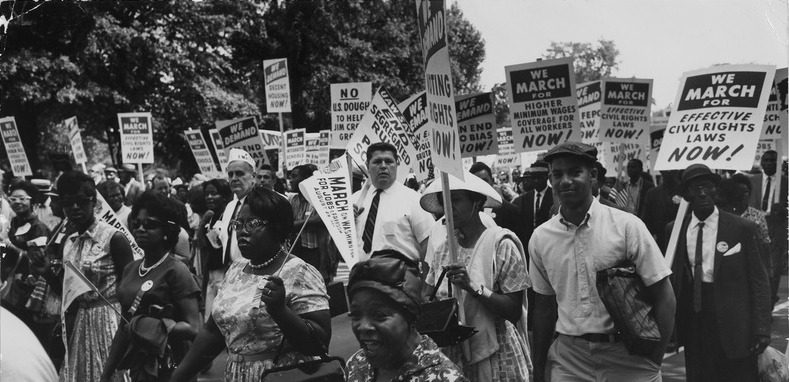
Organized by the Southern Christian Leadership Conference (SCLC) and led by the Rev. Martin Luther King Jr., the Poor People's Campaign mobilized tens of thousands of people across the country to demand economic justice in 1968.
Said King: "America is at a crossroads of history, and it is critically important for us as a nation and a society to choose a new path and move upon it with resolution and courage. In this age of technological wizardry and political immorality, the poor are demanding that the basic needs of people be met as the first priority of our domestic program."
AFSC was one of the principal endorsers of the Poor People's Campaign.
Early on, King sought help from AFSC, citing his gratitude for "the devotion, cooperation and help accorded us in the past by the AFSC." AFSC’s Barbara Moffet worked directly with King and SCLC to develop the campaign's platform. As AFSC and other organizers from 10 cities and five rural areas strategized and gathered supplies, King was assassinated on April 4, 1968. Organizers decided to continue the campaign in King’s honor, and AFSC and other organizers mobilized people across the country to come to Washington, D.C. for two weeks of protest, including setting up a shantytown known as "Resurrection City."
The campaign united people from many backgrounds across the country, who presented their plan to lawmakers in Washington and urged them to work toward solutions. Under the "economic bill of rights," the Poor People's Campaign asked for the federal government to prioritize helping the poor with a $30 billion anti-poverty package that included a commitment to full employment, a guaranteed annual income measure, and more low-income housing.
But by mid-June of 1968, Resurrection City was closed down, and many protesters had been arrested, including AFSC's Stephen Cary. The economic bill of rights was never passed.
Cary later wrote: "I supposed the Poor People's Campaign will be judged to have failed. Certainly, it has not produced the jobs and income that were its goal. But it did prove three things: It has made poverty in America visible, and never again will it be possible to pretend that it is not real. It created a coalition of the poor. It has improved the administration of existing legislation and stimulated new legislation in which [people of many backgrounds] have all seen for the first time the common nature of their problems and have joined together to deal with them."
Learn more about the Poor People's Campaign by exploring the archival materials below:
King's 1967 "Domestic Impact of War" speech
King noted: "We spend approximately $500,000 to kill a single enemy soldier in Viet Nam, and yet we spend about $53.00 for each impoverished American in anti-poverty programs."
A December 1967 statement by King on the developing campaign
"We have learned from hard and bitter experience in our movement that our government does not move to correct a problem involving race until it is confronted directly and dramatically. ... What we need is a new kind of Selma or Birmingham to dramatize the economic plight of the Negro, and compel the government to act."
King's 1967 letter to AFSC, asking for the organization's support
King wrote to AFSC head Collin Bell: "I am convinced in advance that you share our feelings of concern and determination to obtain justice for the least of us in this great country."
April 1968 letter from Martin Luther King, Jr. asking for support for the Poor People's Campaign
King wrote: "A pilgrimage of the poor will gather in Washington from the slums and rural starvation regions of the nation. We will go there, will demand to be heard, and we will stay until America responds."
1968 Poor People's Campaign Brochure
The brochure reads: "Why are people poor? Poor people are kept in poverty because they are kept from power. We must create 'poor people's power.'"
AFSC's Stephen Cary urges religious leaders to carry on the Campaign after King's assassination
The day after King’s assassination, the AFSC’s Stephen Cary asked religious leaders to come to Washington, noting, “It is our conviction that one million must replace the one who has been shot down.”
1968 fact sheet on the Poor People's Campaign rally
“Let us continue his work” was the theme of an April 29, 1968 rally to support the Poor People’s Campaign.
AFSC's Stephen Cary's reflection on the campaign: "Number 160074: The View from Inside"
After AFSC's Stephen Cary’s arrest and detention during the Poor People’s Campaign, he wrote “I learned a lot in the twenty-eight hours between my arrest and trial. I learned what it is to be nobody.”